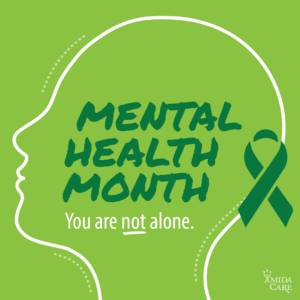Mental Health Awareness Month During the COVID-19 Crisis

As we continue to confront the COVID-19 crisis in New York, many of us are dealing with feelings of sadness, anxiety, and isolation. Even if we haven’t personally experienced the devastating effects of the virus or the loss of a loved one, we may be struggling with a range of emotions and reactions to the current circumstances. Those who were already affected by mental health issues before the pandemic may be especially hard hit.
Since 1949, May has been observed as National Mental Health Awareness Month, a time to focus on educating the public about conditions including depression, schizophrenia, and bipolar disorder; the realities of living with such conditions; and strategies for attaining mental health and wellness.
According to the Centers for Disease Control (CDC), 1 in 5 Americans will experience a mental health issue in any given year. In New York City, 1 in 10 adults experience mental health challenges serious enough to affect functioning in work, family, or school life. During the COVID-19 pandemic, these numbers may be much higher.
According to the CDC, stress during a public health emergency can include:
- Fear and worry about your own health and the health of your loved ones
- Changes in sleep or eating patterns
- Difficulty sleeping or concentrating
- Worsening of mental health conditions
- Increased use of alcohol, tobacco, or other drugs
People who may respond more strongly to the stress of a crisis include:
- Older people and people with chronic conditions who are at higher risk for severe illness from COVID-19
- Children and teens
- People who are helping with the response to COVID-19, like doctors, other health care providers, and first responders
- People who have behavioral health conditions, including problems with substance use
Tips to Take Care of Your Mental Health at Home
It’s important to remember that there are many ways to lessen anxiety and feel better:
- Keeping physically fit, whether unwinding with a virtual yoga class, moving to the rhythms of an African or Latin dance class, or taking a brisk walk outdoors
- Practicing stress reduction techniques, including yoga, meditation, or aromatherapy
- Boosting your mood and finding deeper meaning in your life through creativity, which can include writing poetry, making a sketch, singing, or taking photos
- Connecting with your family, friends, and community, through FaceTime, Zoom, Skype or phone calls
- Being mindful of nutrition by making sure your meals are providing the nutrients you need to feel your best
Often, relief can come from speaking with a mental health counselor. These professionals are trained to understand exactly what you’re feeling and why, and they can give you great tools for handling the pandemic—and the rest of your life, as well.
Mental health issues are extremely common, especially now, and there are many ways to get help.
Resources
Amida Care members can call Beacon Health Options directly for support: 866-664-7142.
The New York State Office of Mental Health emotional support hotline (7 days a week from 8 am to 10 pm): 1-844-863-9314.
General Mental Health Resources (CDC)
Stress and Coping with COVD-19 (CDC)
NYC Department of Health and Mental Hygiene
National Alliance on Mental Illness
Amida Care currently serves over 7,500 members throughout the five boroughs of New York City, including people living with HIV/AIDS; people of transgender experience, regardless of HIV status; and people who are experiencing homelessness, regardless of HIV status. Please contact us at 1-855-GO-AMIDA to be directed to more health resources.
